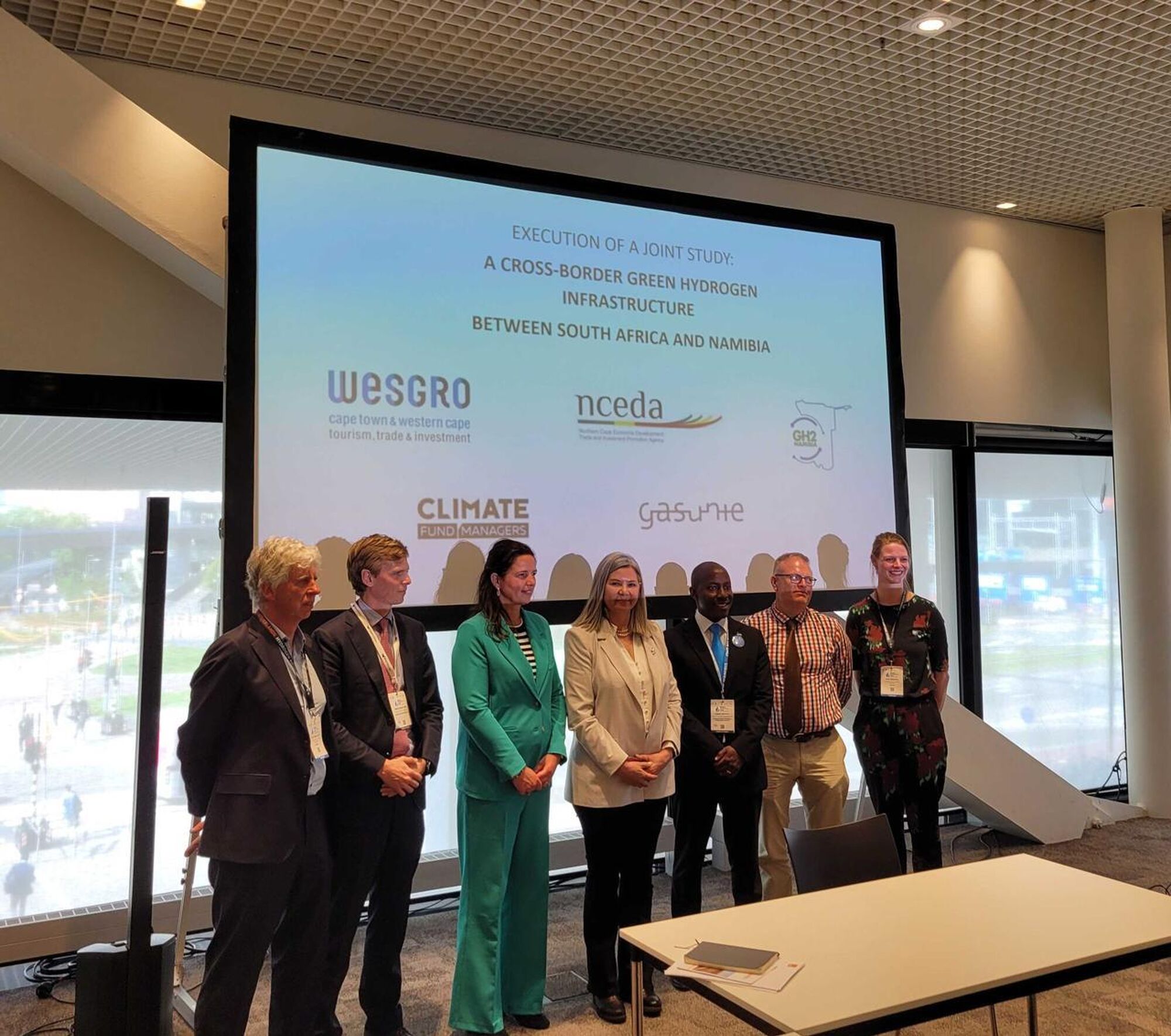Wesgro enters into MoU to unlock green hydrogen opportunities
- Wesgro, NCEDA, Namibia’s Environmental Investment Fund, Gasunie, and Climate Fund Managers have signed a memorandum of understanding (MoU).
- The MoU kicks off the pre-feasibility study to determine the viability of building a green hydrogen pipeline connecting the Western Cape, Northern Cape, and Luderitz (the Western SADC Green Hydrogen production corridor).
Wesgro, the official tourism, trade, and investment agency for Cape Town and the Western Cape, has entered into a partnership aimed at exploring the feasibility of a green hydrogen pipeline connecting the Western SADC green hydrogen corridor.
The collaborative effort aims to advance the development of green hydrogen infrastructure linking the Western Cape and Northern Cape regions of South Africa with the Lüderitz/Windhoek region in Namibia. The partnership includes Namibia’s Environmental Investment Fund and Gasunie, a leading Dutch natural gas infrastructure and transportation company. Also joining the initiative are the Northern Cape Economic Development, Trade, and Investment Promotion Agency (NCEDA), and Climate Fund Managers, a renowned climate-centric finance fund manager.
The MoU, signed at the World Hydrogen Summit in Rotterdam on Tuesday, highlights the commitment of these parties to advance sustainable energy solutions. The initiative builds upon previous agreements between South Africa, Namibia, and the Netherlands, signalling a collective effort to explore cross-border green hydrogen infrastructure.
The collaborative study, which is expected to be completed by the end of 2024, aims to assess technical, commercial, financial, socio-economic, and operational aspects to determine the feasibility of establishing a green hydrogen corridor. Spanning key regions in South Africa and Namibia, including the Western Cape, Northern Cape, and targeted expansion into the Eastern Cape, the project seeks to stimulate economic growth by connecting green hydrogen hubs, markets, and industries.
The collaboration is in line with South Africa's overarching commitment to adopt green hydrogen as a driver of economic expansion and environmental sustainability. Western Cape Premier Alan Winde and his Northern Cape counterpart Zamani Saul previously signed a landmark MoU towards establishing a Western SADC Green Hydrogen Hub and Corridor. This initiative not only contributes to achieving net-zero energy goals but also aims to attract foreign investment and drive economic growth.
Immense promise
Green hydrogen, derived from renewable energy sources, holds immense promise in addressing global energy demands and combating climate change. Namibia, known for its abundant sunlight and vast expanses, seeks to leverage green hydrogen production to establish itself as a renewable energy hub in Africa. In South Africa, green hydrogen offers a viable solution to supplement renewable energy sources by providing a reliable energy storage medium.
Wesgro CEO, Wrenelle Stander, lauded the MoU as a significant step towards unlocking green hydrogen opportunities and decarbonising the economy. "This collaboration sends a clear signal to investors that renewable energy is a priority. By attracting green investments and implementing supportive policies, we can accelerate our journey towards a low-carbon future," said Stander. "As we strive to accelerate the transition to a green economy, initiatives like this are crucial in attracting investments that promote clean energy and sustainable development."
Hendrik Louw, the acting CEO of NCEDA, pointed out the MoU's significance in showcasing SADC and Africa as global players in Just Energy Transition Partnerships. He outlined the Northern Cape's role in supporting the regional value chain for bulk production, aggregation, exports, and national distribution to central South Africa, contributing to the decarbonisation of the economy.
James Mnyupe, Economic Advisor to the President of Namibia and Green Hydrogen Commissioner, expressed enthusiasm for the Namibian Green Hydrogen Programme's exploration of Africa’s first cross-country hydrogen backbone. “It promises to anchor transformative investment opportunities along its pathway,” he said.
Gasunie, recognised for its expertise in gas infrastructure management, sees strategic value in enhancing hydrogen cooperation, and brings valuable insights and experience to the project as a key knowledge partner. The company is actively engaged in developing the Netherlands' hydrogen infrastructure and has been entrusted by the government to spearhead the National Hydrogen Network project.
Vusi Madonsela, the South African Ambassador to the Netherlands, highlighted that the MoU signing strengthens the enduring ties between the two nations, noting the potential of green hydrogen to decarbonise both economies and promote shared prosperity. The agreement stems from the government-to-government MoU on green hydrogen signed in June 2023, he added.
Strategic infrastructure investments
Harry Malila, Director-General of the Western Cape Government, also endorsed the MoU, highlighting its potential to drive substantial investment in green hydrogen infrastructure. "The Cabinet will be reviewing the green hydrogen strategy on Wednesday. This strategy will lay the groundwork for significant investment and align with our Growth for Jobs (G4J) strategy," Malila stated. The G4J strategy is the Western Cape Government's new economic growth plan, aiming to stimulate private sector-led growth through strategic infrastructure investments that boost growth and exports.
Western Cape Minister of Finance and Economic Opportunities, Mireille Wenger, said: “By working together, Wesgro, NCEDA, Namibia’s Environmental Investment Fund, Gasunie, and Climate Fund Managers are perfectly positioned to explore the potential of green hydrogen and increasing demand through production, bulk exports, and by attracting foreign direct investment which will contribute to economic growth and job creation in the context of ensuring a Just Energy Transition.”
“Building a green, energy resilient future and enjoying the benefits of this will not be possible without partnerships across all levels of government as well as the private sector. The MoU signed is a wonderful example of how we can work together and act to ensure a brighter future, based on economic growth which creates many more jobs across our regions,” concluded Wenger.
During the World Hydrogen Summit, Wesgro is engaging with a diverse array of key stakeholders, including leading nations in green hydrogen production, prominent corporations, and financial institutions. The objective is to glean insights into optimal strategies for boosting and enticing investments in green hydrogen initiatives.


